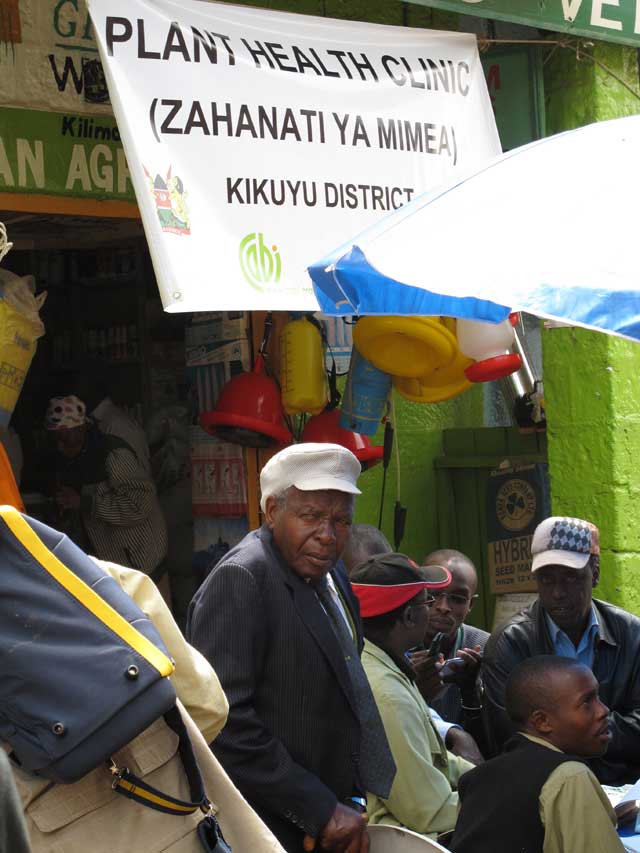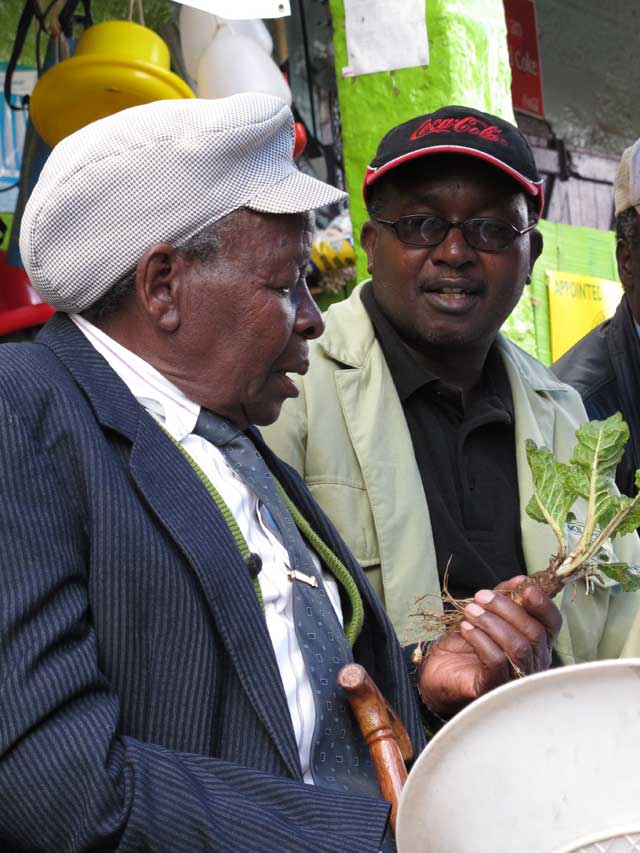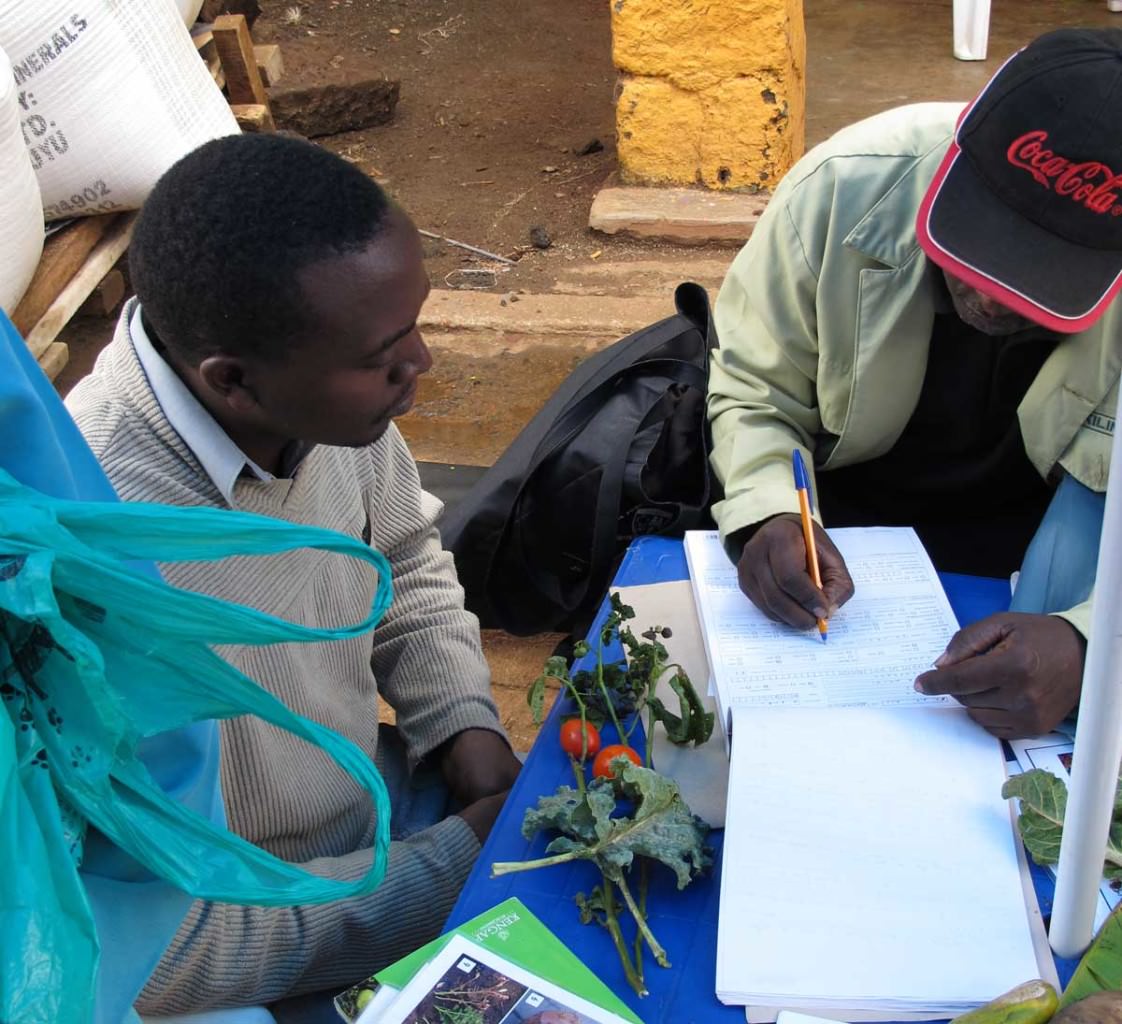How Kenya’s Betting on Plant Clinics to Help Feed Their Country
In Kenya, up to 40 percent of crop yields are lost to pests and diseases. The solution? Plant clinics.
Modeled along the human health services, plant clinics were introduced in the country in 2010, but due to some apprehension about embracing new technologies, the impacts weren’t really felt in 2012. Since then, plant clinics have been credited with boosting yields through timely interventions, creating a repository of emerging diseases that guides scientific research, and protecting the country from international threats.
Now, the country hopes that plant clinics will transform the country’s food security landscape like they have in countries like the United States, where the concept dates as far back as 1954. In the US, plant clinics, like the one at the University of Illinois and the Morton Arboretum, 25 miles west of Chicago, have been instrumental in protecting the country from foreign attacks. In Montana, for example, plant clinics have been credited with protecting the $100 million wheat, $4 million cherry, and $5.4 million alfalfa seed industries, while also providing timely diagnosis that nips the diseases before causing major damage. Plus, plant health has received special attention at institutions of higher learning, which offer specific and tailor-made courses that concentrate on plant pathology. The University of Florida, for example, offers a PhD program in plant medicine.
Ӣ University of Minnesota Plant Disease Clinic
Ӣ Thurston County (Olympia, Washington) plant clinics
Ӣ University of Illinois Plant Clinic
Ӣ The Morton Arboretum Plant Clinic
Ӣ University of Maryland, Montgomery County Plant Clinics
Ӣ Fairfax County (Virginia) Neighborhood Plant Clinics
Ӣ The Oregon State University Plant Clinic
Ӣ UC Berkeley Botanical Garden Sick Plant Clinic
Ӣ Iowa State University Plant and Insect Diagnostic Clinic
Ӣ Virginia Tech Plant Disease Clinic
Ӣ Cornell University Plant Disease Diagnostic Clinic
Ӣ Washington State University Diagnostic Plant Clinics
There have been pay-offs to these interventions. In October this year, the University of Illinois plant clinic raised a red flag on a new corn bacterial leaf disease dubbed Bacterial Stripe, which is common to Nebraska and other western states, after corn leaf samples tested positive for the causal agent of the disease. Bacterial Stripe was new to the region, so plant pathologists couldn’t estimate the damage on yields but warned farmers to be on the lookout for the disease in the next season.
Though Kenya is yet to have such elaborate and advanced interventions, private research groups and the government are taking baby steps in addressing threats to food security in a sector that provides income to more than 75 percent of the population and contributes 30 percent to the country’s GDP. Led by the research institution Centre for Agricultural Bioscience International (CABI), in partnership with Kenyan research institutions and government, the model has trained approximately 268 plant doctors and recorded 11,600 plant health queries.
On a Saturday morning at the busy Wangige market, some 20 kilometers (about 12 miles) away from Kenya’s capital Nairobi, a group of farmers queue up outside outdoor kiosks, each holding their “patient” in black plastic bags. Four doctors sit in wooden chairs accompanied by their tools of trade: microscopes, pen knives, laptop, and magnifying lenses.
“I have spotted strange worms in my spinach which turn the leaves white. I have spent over Ksh. 10,000 ($100) in pesticides but nothing is working. I don’t think I will harvest anything this season,” farmer Jonathan Mukoma explains to Dr. Simon Simiyu, one of the doctors from the CABI program, who gives Mukoma undivided attention before dissecting the sample with surgical precision. After a few minutes Dr. Simiyu spots the problem: “These pests are called aphids and you should stop using the pesticides you have been buying. Go spray wood ash and give them time. The problem should go away. Come back after a week and let me know the progress,” he says, before ushering the next patient.
Clinics like these have halted major diseases like the virulent Maize Lethal Necrosis, which hit Kenya’s food baskets in 2012, destroying 300,000 metric tons of corn yield in one year according to CABI, and tomato leaf miner, dubbed Tuta Absoluta, which wipes out up to 100 percent yields in days. CABI has also been carrying out plant health rallies across areas where the disease and pests are rampant, to train farmers on early detection and control measures. According to Dr. Simiyu, there have been reduced cases of farmers reporting diseases like Maize Lethal Necrosis due to the advice they receive from the clinics. “We teach them low-cost control methods like uprooting and burning the infected maize to tame further spread. We have also trained them on crop rotation to stem the spread of Tuta Absoluta,” he says.


But the clinics have also protected the country from foreign attacks: At the Kenya/Uganda border, plant clinics helped avert the spread of the notorious black stem rust called Ug 1999 originating from Uganda, according to Dr. Patrick Muhenzo, a plant doctor at Kapkoi Center near the border. Because Kenyan and Ugandan farmers trade freely, the disease is easier to transport. Samples submitted at the clinics spotted high levels of the fungus. The center screens any samples coming in from Uganda to Kenya while educating farmers on ways of identifying infected grains. In 2013, according to Muhenzo, heightened surveillance at the border through screening of the grains not only provided them with a information on how the disease spreads, but also allowed them to train farmers how to identify the disease and avoid buying infected varieties.
Finally, according to Dr. Lilian Wafula, another plant doctor from the CABI program, “The clinics also train farmers good farming practices like crop rotation to ward off pests and increase soil fertility. It is not just about increasing yields but also saving farmers’ incomes. On average farmers spend 40 percent of their profits on wrong pesticides. We show them cheaper alternatives.”
As Kenya’s population burgeons – putting pressure on food production even as 22 percent of the country’s population remains food insecure – plant clinics are viewed as a panacea to the country’s episodic hunger. You can assist the initiative in Kenya (and around the world) by becoming a donor, requesting for plant clinics, and becoming a partner. Visit CABI’s initiative, Plantwise for more information on how to participate.
Follow us
This work is licensed under a Creative Commons Attribution-NoDerivatives 4.0 International License.
Want to republish a Modern Farmer story?
We are happy for Modern Farmer stories to be shared, and encourage you to republish our articles for your audience. When doing so, we ask that you follow these guidelines:
Please credit us and our writers
For the author byline, please use “Author Name, Modern Farmer.” At the top of our stories, if on the web, please include this text and link: “This story was originally published by Modern Farmer.”
Please make sure to include a link back to either our home page or the article URL.
At the bottom of the story, please include the following text:
“Modern Farmer is a nonprofit initiative dedicated to raising awareness and catalyzing action at the intersection of food, agriculture, and society. Read more at <link>Modern Farmer</link>.”
Use our widget
We’d like to be able to track our stories, so we ask that if you republish our content, you do so using our widget (located on the left hand side of the article). The HTML code has a built-in tracker that tells us the data and domain where the story was published, as well as view counts.
Check the image requirements
It’s your responsibility to confirm you're licensed to republish images in our articles. Some images, such as those from commercial providers, don't allow their images to be republished without permission or payment. Copyright terms are generally listed in the image caption and attribution. You are welcome to omit our images or substitute with your own. Charts and interactive graphics follow the same rules.
Don’t change too much. Or, ask us first.
Articles must be republished in their entirety. It’s okay to change references to time (“today” to “yesterday”) or location (“Iowa City, IA” to “here”). But please keep everything else the same.
If you feel strongly that a more material edit needs to be made, get in touch with us at [email protected]. We’re happy to discuss it with the original author, but we must have prior approval for changes before publication.
Special cases
Extracts. You may run the first few lines or paragraphs of the article and then say: “Read the full article at Modern Farmer” with a link back to the original article.
Quotes. You may quote authors provided you include a link back to the article URL.
Translations. These require writer approval. To inquire about translation of a Modern Farmer article, contact us at [email protected]
Signed consent / copyright release forms. These are not required, provided you are following these guidelines.
Print. Articles can be republished in print under these same rules, with the exception that you do not need to include the links.
Tag us
When sharing the story on social media, please tag us using the following: - Twitter (@ModFarm) - Facebook (@ModernFarmerMedia) - Instagram (@modfarm)
Use our content respectfully
Modern Farmer is a nonprofit and as such we share our content for free and in good faith in order to reach new audiences. Respectfully,
No selling ads against our stories. It’s okay to put our stories on pages with ads.
Don’t republish our material wholesale, or automatically; you need to select stories to be republished individually.
You have no rights to sell, license, syndicate, or otherwise represent yourself as the authorized owner of our material to any third parties. This means that you cannot actively publish or submit our work for syndication to third party platforms or apps like Apple News or Google News. We understand that publishers cannot fully control when certain third parties automatically summarize or crawl content from publishers’ own sites.
Keep in touch
We want to hear from you if you love Modern Farmer content, have a collaboration idea, or anything else to share. As a nonprofit outlet, we work in service of our community and are always open to comments, feedback, and ideas. Contact us at [email protected].by Bob Koigi, Modern Farmer
December 9, 2015
Modern Farmer Weekly
Solutions Hub
Innovations, ideas and inspiration. Actionable solutions for a resilient food system.
ExploreExplore other topics
Share With Us
We want to hear from Modern Farmer readers who have thoughtful commentary, actionable solutions, or helpful ideas to share.
SubmitNecessary cookies are absolutely essential for the website to function properly. This category only includes cookies that ensures basic functionalities and security features of the website. These cookies do not store any personal information.
Any cookies that may not be particularly necessary for the website to function and are used specifically to collect user personal data via analytics, ads, other embedded contents are termed as non-necessary cookies.
